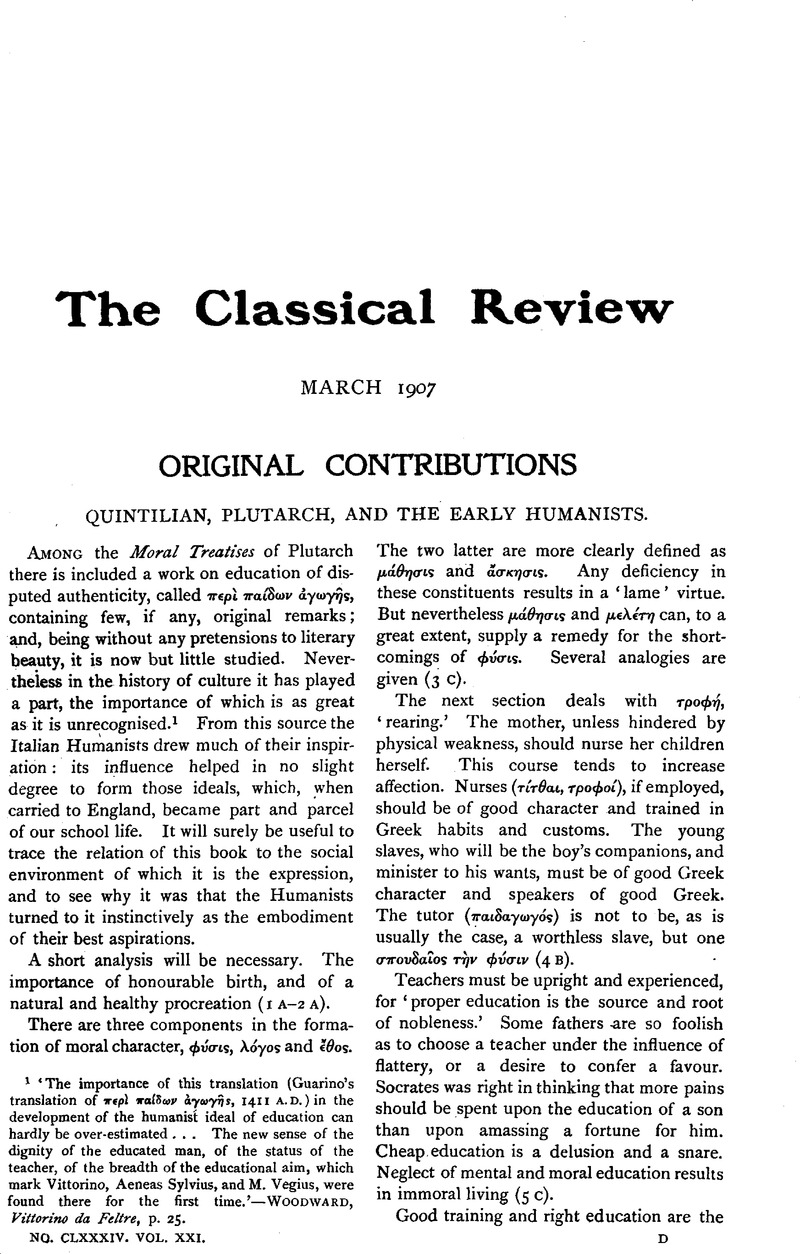Article contents
Quintilian, Plutarch, and the Early Humanists
Published online by Cambridge University Press: 27 October 2009
Abstract

- Type
- Review Article
- Information
- Copyright
- Copyright © The Classical Association 1907
References
page 33 note 1 ‘The importance of this translation (Guarino's translation of ![]() , 1411 A. D.) in the development of the humanist ideal of education can hardly be over-estimated … The new sense of the dignity of the educated man, of the status of the teacher, of the breadth of the educational aim, which mark Vittorino, Aeneas Sylvius, and M. Vegius, were found there for the first time.’—Woodward, Vittorino da Feltre, p. 25.
, 1411 A. D.) in the development of the humanist ideal of education can hardly be over-estimated … The new sense of the dignity of the educated man, of the status of the teacher, of the breadth of the educational aim, which mark Vittorino, Aeneas Sylvius, and M. Vegius, were found there for the first time.’—Woodward, Vittorino da Feltre, p. 25.
page 35 note 1 ![]() 3 c–4 B; Quint. I. i. 1–9.
3 c–4 B; Quint. I. i. 1–9.
page 35 note 2 π. π. ἀγ. 4 c–5 c; Quint. II. ii. iii.
page 35 note 3 π. π. ἀγ 6 A–7 A.
page 35 note 4 Qunit. X. vii.
page 35 note 5 3 E.
page 35 note 6 4 A.
page 35 note 7 7 C.
page 35 note 8 7 A.
page 35 note 9 If we except his vacillation on the question of παιδεραστία, II D–F.
page 35 note 10 8 A.
page 35 note 11 The nearest approach to such a mention is in 8 A, where the philosophic life divorced from the practical is said to be useless (ὰνωφελής).
page 35 note 12 8 E.
page 36 note 1 8 D.
page 36 note 2 10 B. See also 6 B–D, and 7 E.
page 36 note 3 1 B.
page 36 note 4 4 C.
page 36 note 5 9 D. The use of έλπίδας referring to children is perhaps a reminiscence of Quintilian, who use spes in the same sense.—Inst. Orat. I. i. 1–4.
page 36 note 6 13 D, E.
page 36 note 7 14 B, C.
page 36 note 8 Ep. VIII; 14. 4 foll.
page 36 note 9 Dial. De Orat. XXXIII. 4 foll and ibid. XXXIV.
page 36 note 10 See Horace Satires II. 2. II, where militia is used in the sense of ‘hard exercise.’
page 37 note 1 ![]() 8 D.
8 D.
page 37 note 2 ![]() 7 C.
7 C.
page 37 note 3 5 B.
page 37 note 4 7 D.
page 37 note 5 9 F.
page 37 note 6 The first of these similes (they are both mentioned above) is not applied to illustrate the same point as Lucretius had in his mind.
page 37 note 7 Inst. Or. I. pro. 9.
page 37 note 8 This is characteristic of the Greek writer also. His ideal is general training with special attention to φιλοσοφια i. e. ethics, 7 c–F.
page 38 note 1 7 E.
page 38 note 2 12 C.
page 38 note 3 ![]() 10 A. This remarkable sentence is worth a passing notice. I know of no other passage in Greek or Roman literature which approaches so near to the modern idea of a ‘sportsman.’
10 A. This remarkable sentence is worth a passing notice. I know of no other passage in Greek or Roman literature which approaches so near to the modern idea of a ‘sportsman.’
page 38 note 4 I. iii. 1–7.
page 38 note 5 I. iii. II.
page 38 note 6 I. pro. 9.
page 38 note 7 I. i. 1.
page 38 note 8 I. i. 2, 3.
page 39 note 1 J. iv. 1.
page 39 note 2 I. i. 12.
page 39 note 3 And apparently of other writers a so. See I. iv. 4; also I. viii. 18.
page 39 note 4 I. ix. 1.
page 39 note 5 I. iv. 22.
page 39 note 6 I. xi. 4–8.
page 39 note 7 I. xi. 15–17.
page 39 note 8 I. viii. 5.
page 40 note 1 I. ix. 2.
page 40 note 2 II. i. 8–10. In the matter of style clearness is of prime importance. II. iii. 8.
page 40 note 3 II. vii.
page 40 note 4 I. x.
page 40 note 5 I. xii. 14.
page 40 note 6 I. xii. 16, 17.
- 1
- Cited by


